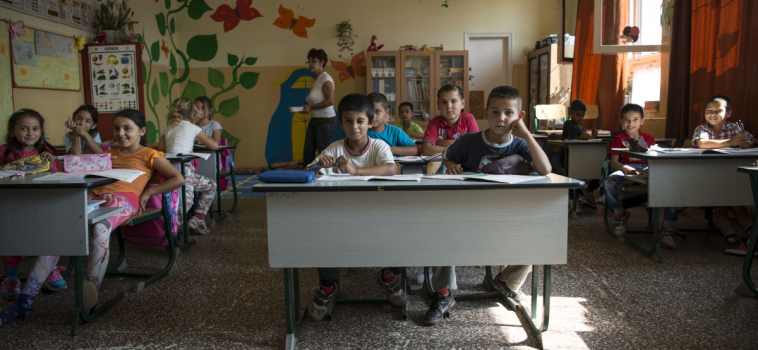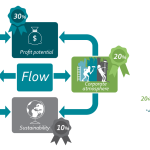Leadership Development for Public Schools
Playing Hard
The Community-Oriented Pedagogy project, which aimed to support the complex development of public schools in the municipality of FeTe (an abbreviation for disadvantaged municipalities) in Hungary, included a significant component: the FLIGBY leadership program. As part of this project, 200 principals and deputy principals were given access to this world-class simulation. The FLIGBY program played a crucial role in enhancing the leadership skills of these educators, equipping them with the necessary tools and strategies to lead their schools effectively.
(This entry was written based on the article ‘Innovative Leadership Development’ by Eszter Szakácsi, originally published in Hungarian in ‘A Felzárkózás Lépései’ in May 2025.)
How is a Winery Similar to a School?
In nothing, and so many ways. The point of this sophisticated simulation is to immerse you as a player in the life of a family-owned winery in California. Here, it soon becomes clear that we are given a virtual eight-month management contract, during which we will certainly not be making wine, but rather our job will be to bring the team together. Through scenes featuring moving and engaging characters, we will come to know the staff, the history of the winery, the estate’s structure, the economic situation, and the problems and conflicts that need to be addressed.
Of course, there is a lot of this because that is the point of the game. The game puts us in real-life situations that often occur in workplace or even faculty communities and this is one of its most significant advantages, because, like in a flight simulator, without any real “damage”, we have the opportunity to experiment several times to see which colleague is at the point where we can bring them back from a disorganised state to a focused, motivated status.
The Perfect Moment in the Classroom
But what is flow? It refers to a positive psychological state in which we become intensely focused, experiencing a kind of excitement that absorbs us in our current activity. As a result, we temporarily step outside the boundaries of realistic perception of space and time. The experience of flow can be experienced both individually and in groups, provided that we are engaged in an activity that is both pleasurable and challenging. We can experience it, for example, while engaging in a hobby, playing a sport, traveling, cooking, creating, or even in the course of exciting tasks that our work provides.
The primary objective of the FLIGBY is to instruct managers, through simulation and subsequent online coaching sessions, on how to engage their staff in this flow state or at least a state closely resembling it, and how this can contribute value to the organisation or institution. Teachers in the FeTe communities can not only translate the techniques learned during the simulation into results in their classrooms, but also apply them to their work with children, helping them learn about the feeling of flow. For teachers who incorporate positive psychology, it is essential to strive for harmony and to get to know the unique personality and individual abilities of each pupil.
Through various playful and enjoyable challenges, children learn to assess their own abilities, limitations, strengths, and weaknesses. During the sessions, they become more curious and motivated, as they can see their goals and realize that they can realistically strive for them, allowing them to experience a sense of achievement. Positive psychology also emphasises the importance of both the joy of progress and self-esteem. The development of personal skills not only enhances individual motivation but also facilitates teamwork. If teachers learn to utilize these tools, it will also dramatically improve students’ attitudes and results.
“A team works well when everyone feels good”
– says Katinka Mezeiné Maróti, head of the Lakócsa Day School of the Drávamenti District Primary School, who, when she heard that the Hungarian Charity Service of the Order of Malta was offering her a development programme based on positive psychology, as represented by Mihály Csikszentmihalyi, was very curious.
“In 2016, I acquired my 3rd degree as a mentor teacher in Szeged, where I first encountered the flow theory and the ideas of Professor Csikszentmihalyi, which I already felt were my own. I enjoyed the simulation, and its completion confirmed my leadership attitudes and functioning. I believe that, in the long term, a school can only plan and work effectively if everyone feels comfortable and at ease. The simulation and the subsequent online coaching session demonstrate that this requires constant balancing, discussions, and attention. However, I believe it is worth it, as an educational institution can only function well if teachers and staff are valued participants. At the same time, FLIGBY has helped me to recognise a weakness of mine, so that I don’t have to change everyone at any cost, and dare to let things go. If one of us makes a mistake, it’s part of the system, we talk about it, learn from it, and move on.”
“The lessons are endless“, says Zad Vecsey, a co-founder of the ALEAS Group, producer of FLIGBY, looking back on two years of cooperation with the Hungarian Charity Service of the Order of Malta.
”The openness of these two hundred teacher-leaders towards the simulation was astonishing. The enthusiastic response from all the teachers was very encouraging. An educational institution is a complex system, an economic entity, a public education system, and, at the same time, a system that must ensure the safe daily existence of children, requiring complex management work that exceeds the management level of even a classic multinational company. The managers-educators involved in the programme always tried to optimise situations skilfully, and good discussions were generated even after the simulations were completed. It was a great feeling to experience how the programme can provide support and help in approaching, untangling, and solving difficult workplace and collegial situations with the idea of flow.”
Positive Experiences and Successes
Marianna Varga, the headmistress of the Csikesz Sándor Primary School at the Reformed College of Pécs in Drávafok, with extensive experience, tells us that this online leadership development simulation is a novel type of experience.
“As I began to get to know the characters and the exciting, twisting story unfolded before me, I became aware of myself, some of my colleagues, and a similar incident and conflict that happened in our school. As a head teacher, I am constantly making decisions, the consequences of which I either foresee well or make mistakes. I liked the fact that I was able to play out a situation several times in the life of the winery, that the outcome did not cause problems in anyone’s life, that I did not feel guilty, and that I could learn from the consequences of my bad decisions.”
For Marianne, the simulation also brought attitudinal insights, as she believes that time management and prioritising tasks in her managerial work still need improvement.
Empowering School Leaders
Introducing FLIGBY in public schools in disadvantaged regions of Hungary was a strategic move. It provided an engaging and practical tool for leadership development, specifically tailored to the needs of school leaders facing complex challenges. Financed by the Hungarian Charity Service of the Order of Malta with EU funds, the program equipped school heads with decision-making and conflict-resolution skills vital for managing under-resourced and high-pressure environments.
FLIGBY’s focus on cultivating ‘Flow’ and team performance helped these leaders foster more effective collaboration among their staff, even under challenging circumstances. The simulation’s realistic scenarios enabled participants to practice adaptive leadership, preparing them to tackle real-world problems with confidence and creativity. Overall, the program significantly enhanced the managerial skills of school leaders, equipping them to drive meaningful change in their communities.





